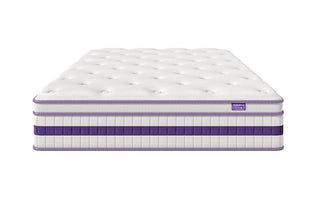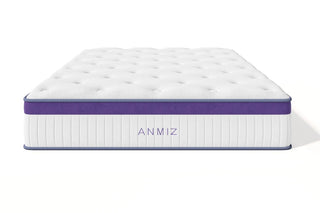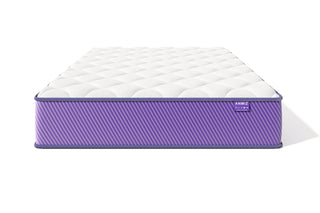Readers who shop hardware chains tell me the same thing: they’ll grab flooring, tools, and paint at Menards, then wander into the mattress aisle and feel unsure. The price tags look friendly, the specs are light, and it’s hard to know what you’re really buying until you sleep on it.
We rotated these beds through our homes over several weeks. Each mattress lived under real alarms, real workdays, late-night streaming, and the usual pet jumps. I tracked how my lower back felt in the morning, how stable the edges were during shoe-tying, whether heat built up under the knit cover, and whether the first-night “wow” held up after a full week.
Product Overview
| Mattress | Pros | Cons | Ideal For | Price (Queen, approx.) | Overall Score |
| Menards Essential Innerspring Mattress | Very low price; simple build; decent airflow | Limited pressure relief; basic motion isolation | Kids’ rooms; infrequent guest rooms | $250–$350 | 3.6 / 5 |
| Menards Gel Memory Foam Mattress in a Box | Strong contouring; quiet surface; easy delivery | Can feel warm to very hot sleepers; weaker edges | Average-weight side sleepers; studio spaces | $400–$550 | 3.9 / 5 |
| Menards Hybrid Support Mattress | Better spine support; more bounce; cooler feel | Medium firmness may feel stiff to some side sleepers | Back sleepers; combo sleepers; heavier bodies | $650–$800 | 4.2 / 5 |
| Menards Plush Pillow Top Mattress | Cushioned surface; friendlier to shoulders; hotel-like first feel | Heavier, harder to move; long-term sag risk | Side sleepers; primary couples’ bed | $750–$950 | 4.1 / 5 |

Testing Team Takeaways
From my seat as lead tester, the biggest takeaway was how sharply comfort changed between tiers. Menards makes the price steps easy to shop, but the feel jump is often bigger than the tag suggests. The Essential Innerspring stayed in “utility” territory. The Gel Memory Foam in a Box felt more refined and quieter, but it leaned toward lighter and mid-weight sleepers. The Hybrid Support tracked my spine best across positions. The Plush Pillow Top delivered a soft, hotel-style landing, with the usual long-term sag question mark.
Marcus spent extra time on the hybrid and the innerspring because his 230-pound frame makes support weaknesses obvious fast. On the budget innerspring, he said, “My hips drop right here if I relax,” and we saw that same hammock effect once he settled in. On the hybrid, his tone changed: “This finally feels like reset support under my lower back,” especially once he started rolling from back to stomach in week two. He also flagged the boxed foam as the warmest option during longer stretches.
Mia gravitated toward the gel foam and the pillow top. At 125 pounds, she can float on firmer hybrids instead of sinking into the comfort layers. On the hybrid, she said her shoulder was “hovering on top of the quilting instead of falling into it.” On the gel foam, she described a “soft pocket for my shoulder,” and noted that her outer hip stayed more cradled during long side-sleep runs. She liked the pillow top for short sessions and called it “hotel bed energy,” but she also felt the deeper quilting tug slightly at her lower back when she rolled.
Jenna focused on partner movement and edges, since she shares a bed at home. On the Essential Innerspring, she felt every shift and described it as “classic spring jolt, like the whole frame yawns,” especially during midnight bathroom trips. With the hybrid and gel foam models, her notes softened: the hybrid had “just enough bounce without shoving me around,” while the gel foam muffled motion well but felt clingier when she tried to roll quickly. Edge support was strongest on the hybrid and the pillow top, which mattered when two people spread out.
Jamal split his nights between the hybrid and the pillow top, with a few naps on the gel foam. After long basketball sessions, he wanted pressure relief without losing push-back. On the gel foam, he said, “My knees feel cushioned, but I lose some drive when I push up.” The hybrid felt more responsive to him: “It lets me load and move without wrestling foam.” The pillow top was the most indulgent, but he noticed a little sink under his hips during longer back-sleeping stretches.
Menards Mattress Comparison Chart
| Mattress | Firmness (1–10) | Height | Core Type | Comfort Materials | Cooling Performance | Support | Pressure Relief | Responsiveness | Motion Isolation | Durability Outlook |
| Menards Essential Innerspring Mattress | 6.5 medium-firm | 8–9" | Open-coil innerspring | Thin fiber pad; basic foam | Good airflow; minimal cooling tech | Moderate for light and mid-weight | Limited at shoulders and hips | High bounce; quick response | Low to moderate | Modest; best for lighter use |
| Menards Gel Memory Foam Mattress in a Box | 6 medium | 10–12" | Foam core | Gel-infused memory foam; transition foam | Fair; surface stays warm for hot sleepers | Adequate for average frames | Strong contouring for side sleepers | Slower response; slight sink-in feel | High for couples | Fair to good under typical use |
| Menards Hybrid Support Mattress | 6.5–7 medium-firm | 11–12" | Pocketed coil support | Quilted foam; thin comfort foam | Better airflow through coils | Strong for back support | Moderate pressure relief | Balanced bounce and contour | Moderate to high | Good with normal maintenance |
| Menards Plush Pillow Top Mattress | 5.5–6 medium-plush | 12–13" | Coil or hybrid core | Thick pillow top with foams | Mixed; surface warms slightly | Good for mid-weight sleepers | Strong at shoulders and outer hips | Slower response in pillow top | Moderate | Medium; sag risk over long years |
What We Tested and How We Tested It
For these Menards mattress reviews, we ran a test cycle that looks like normal life, not a quick showroom try. Each bed spent at least ten full nights with one core sleeper, then rotated to other testers for shorter sessions and naps. Queen-size units sat on solid platform foundations to limit extra variables.
We tracked three main categories first: support, pressure relief, and temperature behavior. Support scores came from visual spine checks, weight-distribution notes, and morning stiffness logs. Pressure relief scores came from side-sleep holds lasting at least thirty minutes, followed by movement drills. Temperature scores reflected surface warmth build-up, back heat perception, and moisture feel under standard cotton sheets.
Secondary categories included motion isolation, responsiveness, edge security, and ease of handling. Motion isolation testing used partner-movement drills plus a simple water-glass test during rolling or getting up. Responsiveness scoring focused on how easily testers shifted positions without feeling trapped. Edge testing involved sitting and tying shoes repeatedly, plus lying near the edge for extended periods. Handling scores reflected weight, packaging, and how many people we needed for setup or rotation.
We converted these experiences into 3.0–5.0 ratings for each bed, and we also logged a firmness feel (1–10) to show where each model landed across body types. Higher scores reflect consistent performance across several testers rather than one standout night. When impressions clashed, I prioritized patterns that repeated across sleepers and still noted the outliers in the narrative.
Related Post: How We Test Mattresses
Menards Mattress: Our Testing Experience
Menards Essential Innerspring Mattress

Our Testing Experience
This one felt old-school right out of the plastic: a simple quilted top, a modest profile, and a clear open-coil build. I started it in a guest room, since that’s where entry-level beds tend to make the most sense. As a 185-pound combo sleeper, my quick read was straightforward. On my back, it kept me reasonably level, but every shift sent movement through the spring unit. On my side, my shoulder pressed in faster than I wanted, and my notes ended with one phrase: “short-stay comfort.”
Mia ran the next stretch because her lighter frame makes pressure issues obvious. She lasted one full night on her side, then moved to the gel foam bed. In the morning she summed it up: “Fine for a quick crash, not for a full week,” especially at her outer hip and shoulder. Back sleeping felt neutral, but not particularly relaxing.
Marcus rotated onto it when we needed a heavier body to stress the support. At 230 pounds, the limits showed up immediately. He called it “bouncy in the wrong way,” because his hips dipped the moment he stopped bracing. On his stomach, his lower back arched instead of staying level. He felt it made more sense for very occasional guests under average weight or for kids’ rooms where smaller bodies don’t overload the coils.
Jenna noticed motion and noise with every turn. We didn’t even keep it in partner rotation long because movement traveled so widely across the surface. Her line captured the vibe: “It’s a shared trampoline more than a shared bed.” At this price, it still has a role, but it’s a limited one: lighter bodies and lighter use.

Pros & Cons
| Pros | Cons |
| Very low entry price point | Limited pressure relief for side sleepers |
| Simple, breathable coil design | Noticeable motion transfer across surface |
| Easy to move and set up | Hips can dip for heavier bodies |
| Works for short stays and kids’ rooms | Thinner profile looks and feels basic |

Details
- Type: Traditional open-coil mattress with a quilted top
- Approximate price (queen): $250–$350, depending on promotion
- Firmness feel: Around 6.5, leaning medium-firm
- Height: Roughly 8–9 inches, with a low-profile look
- Core: Open-coil innerspring unit with interconnected springs
- Comfort layers: Thin fiber pad and basic polyurethane foam
- Cover: Simple polyester knit with light quilting
- Cooling behavior: Good airflow through coils; no advanced cooling materials
- Pressure relief: Limited at shoulders and hips, especially for side sleepers
- Responsiveness: High bounce and quick response to movement
- Motion isolation: Modest; noticeable movement when partners shift
- Edge support: Fair while sitting; some roll-off feeling while lying
- Durability outlook: Best suited for low-use spaces or lighter bodies
- Shipping: Store pickup or local delivery from Menards; fees vary by location
- Trial options: Governed by Menards return rules for bedding in your region
- Warranty: Typically a basic limited warranty; details depend on the product tag
Review Score
| Metric | Score | Remarks |
| Support | 3.5 | Keeps average backs roughly level, but sags under heavier hips. |
| Pressure Relief | 3.2 | Minimal cushioning; side sleepers feel joints press into the build. |
| Cooling | 4.3 | Open coils moved air well under cotton sheets in our tests. |
| Motion Isolation | 3.1 | Springs carry partner movement from one side to the other. |
| Responsiveness | 4.6 | Very bouncy surface that reacts quickly to position changes. |
| Durability | 3.3 | Better for guest rooms; daily heavy use stresses springs faster. |
| Edge Support | 3.8 | Acceptable for sitting, but narrower-feeling when lying near the edge. |
| Ease of Setup | 4.7 | Lightweight build that one strong person can maneuver. |
| Overall Score | 3.6 | Functional budget option with clear comfort limits. |
Menards Gel Memory Foam Mattress in a Box

Our Testing Experience
This one arrived compressed in a cardboard box, similar to what you get from most bed-in-a-box brands. Once we cut the wrap, it expanded slowly and had a faint new-foam smell, but a few hours by an open window cleared it out. I slept on it for a full week in my smaller second bedroom to mimic a studio-style setup. On my back, my lumbar area felt cushioned without collapsing, and on my side I felt real relief at my upper back and outer hip.
Mia enjoyed this stretch of testing. She usually floats above firmer hybrids, but here she sank into the gel memory foam in a slow, even way. Her note the first morning: “My shoulder finally slides down without my neck twisting.” The tradeoff was warmth. After several hours under a regular comforter, she called it “cozy, then slightly sticky warm.”
Marcus tried this option after a heavy lifting day. He liked the contour at first, but once his body heat built up, he started sinking deeper and described feeling “locked in this rut.” Rolling from side to stomach took more effort than on the hybrid, and he also noted more heat compared with the coil-based models. He cranked up the fan and ditched a blanket to stay comfortable.
Jenna rated this model highest for motion isolation. When I rolled or sat up abruptly, she barely noticed. Her tracker note after partner drills: “movement muffled in every direction.” If you want a quiet surface and don’t mind a bit of sink-in, this is the most straightforward pick of the four.
Pros & Cons
| Pros | Cons |
| Strong contouring for shoulders and hips | Sleeps warm for heat-sensitive users |
| Excellent motion isolation for couples | Edges feel softer and less secure |
| Boxed shipping fits small spaces | Slower response can feel “stuck in” |
| Good value for side sleepers at Menards | Heavy bodies may compress deeper over time |

Details
- Type: All-foam Menards mattress in a box
- Approximate price (queen): $400–$550, depending on thickness and sale
- Firmness feel: Around 6, medium with noticeable hug
- Height: Commonly 10–12 inches, depending on SKU
- Core: High-density polyurethane support foam
- Comfort layers: Gel-infused memory foam plus a transition layer
- Cover: Stretch knit cover, typically not meant to be removed
- Cooling behavior: Gel helps a bit, but foam can still retain heat for hot sleepers
- Pressure relief: Strong for average-weight and lighter side sleepers
- Responsiveness: Slower, classic memory-foam response with gradual rebound
- Motion isolation: High; partner movement stays contained
- Edge support: Softer perimeter; deeper compression when sitting
- Durability outlook: Fair to good for moderate weights with rotation
- Shipping: Boxed delivery from Menards or in-store pickup; convenient for apartments
- Trial options: Subject to Menards sleep product policies in your state
- Warranty: Usually in the 8–10-year limited range; check the specific product card
Review Score
| Metric | Score | Remarks |
| Support | 3.9 | Holds average backs well; heavier sleepers sink more deeply. |
| Pressure Relief | 4.5 | Excellent contouring at shoulders and hips for Mia and me. |
| Cooling | 3.4 | Gel helps a bit; hot sleepers still feel warmth build-up. |
| Motion Isolation | 4.7 | Very low partner disturbance during our drills. |
| Responsiveness | 3.6 | Slower rebound; some testers reported a mild “stuck” feeling. |
| Durability | 3.8 | Foam density seems fine for mid-weight users with rotation. |
| Edge Support | 3.4 | Perimeter compresses quickly when sitting or lying close. |
| Ease of Setup | 4.6 | Boxed format moves easily through stairs and tight doors. |
| Overall Score | 3.9 | Strong comfort for side sleepers within this Menards lineup. |
Menards Hybrid Support Mattress

Our Testing Experience
Hybrids make up a big chunk of the Menards floor now, so we picked a mid-priced model with pocketed coils and modest foam layers. Under my back, it landed right in my comfort range. The coil unit kept my hips lifted, and the quilted top added enough softness that my shoulder didn’t feel jammed during early side-sleep stretches. When I rolled from back to side, it felt controlled rather than sudden.
Carlos, a steady back sleeper, spent the longest continuous span on this mattress. He told us, “My spine finally feels straight front to back,” especially after multi-hour stretches watching TV in bed and then dozing off. After a full workweek on this hybrid, he reported less stiffness than he did on the gel foam option. He also liked how predictable the transition felt from the quilted top to the coil support when he turned slowly.
Marcus also favored this hybrid for his frame. On his stomach, his hips stayed up instead of sinking into a center pocket. He still felt some warmth in the comfort layer, but far less than on the all-foam bed. The edge coils held up well when he sat to tie shoes, with noticeably less collapse than the budget innerspring.
Jamal used the hybrid after tough gym days. He cares about bounce when he pushes up from the surface, and this model gave him the kind of response that makes repositioning easy. For shoppers looking for a Menards mattress that works for everyday back and combo sleeping, this was the most even blend of support, comfort, and temperature control in our group.
Pros & Cons
| Pros | Cons |
| Strong support for back and stomach sleepers | Side sleepers wanting extra plushness may want more cushion |
| Better airflow than all-foam models | Medium-firm feel may intimidate very light users |
| Pocketed coils limit motion spread somewhat | Price sits above entry level at Menards |
| Reliable edge strength for sitting and lying | Top layers feel basic versus luxury hybrids |
Details
- Type: Pocketed-coil hybrid Menards mattress
- Approximate price (queen): $650–$800, midrange zone
- Firmness feel: Around 6.5–7, clear medium-firm character
- Height: Roughly 11–12 inches, with single-sided design
- Core: Individually wrapped steel coils, with mild center zoning in our sample
- Comfort layers: Quilted foam cover plus a thin polyurethane comfort layer
- Cover: Tight-top or light Euro-top knit with a simple pattern
- Cooling behavior: Noticeably better airflow through the coil core than the foam bed
- Pressure relief: Moderate; adequate for many backs and combo sleepers
- Responsiveness: Balanced bounce and contour; easier repositioning than memory foam
- Motion isolation: Moderate; pocketed coils reduce but do not erase partner feel
- Edge support: Solid; usable seating and sleeping surface near rails
- Durability outlook: Good for average and heavier bodies with rotation and proper foundation
- Shipping: In-store delivery or special-order freight, depending on region
- Trial options: Tied to Menards and specific manufacturer comfort policies
- Warranty: Commonly near 10 years limited; verify on the product label
Review Score
| Metric | Score | Remarks |
| Support | 4.5 | Keeps spines more level across positions than the other models we tested. |
| Pressure Relief | 3.9 | Enough cushion for most, but not ultra-plush at the shoulders. |
| Cooling | 4.2 | Airflow through coils felt noticeably cooler than the all-foam option. |
| Motion Isolation | 3.8 | Pocketed coils reduce transfer, but some movement still travels. |
| Responsiveness | 4.4 | Easy to roll and sit up; the surface feels lively but controlled. |
| Durability | 4.2 | Coil build and foams look better suited for regular long-term use. |
| Edge Support | 4.4 | Edges supported sitting and lying without drastic sink. |
| Ease of Setup | 3.7 | Heavier build; two people made setup and rotation safer. |
| Overall Score | 4.2 | Most balanced performer in our Menards group. |
Menards Plush Pillow Top Mattress

Our Testing Experience
This bed looked plush the moment it came off the truck—tall profile, thick pillow top, and deep quilting. I set it up in my primary bedroom and treated it like a main couple’s mattress for several weeks. On my side, it gave my shoulder and outer hip a deeper cradle than the hybrid. My lower back felt supported at first, but after longer sessions I noticed a little drift when I fully relaxed, especially late at night.
Mia enjoyed it for pure comfort. She called the top “marshmallow without the sugar crash,” meaning generous cushioning without immediate ache. Her lighter frame didn’t sink as far into the core, which helped her keep a more neutral line. For back-sleeping movie nights, she was happy, but she still preferred something slightly firmer as an everyday long-term bed.
Jenna ran her usual couple tests here. Motion transfer was lower than on the Essential Innerspring but higher than on the all-foam option. She summed it up neatly: “I feel the movement as a slow wave, not a sharp jolt.” For a plush build, edge support stayed usable. She could sit on the side scrolling her phone without sliding off, though she did feel deeper compression near the perimeter.
Jamal used it on recovery nights after hard workouts. His joints liked the initial give under knees and hips. After a few hours flat on his back, he noticed his hips sink a bit more than he prefers, which mirrors what Marcus tends to see with plush designs. In practice, Jamal viewed this as a strong pick for side-heavy sleepers or lighter couples, while heavier, back-dominant sleepers usually did better on the hybrid.
Pros & Cons
| Pros | Cons |
| Deep cushioning at shoulders and hips | More sag risk over time for heavier bodies |
| Tall profile with a “hotel bed” feel | Warmer surface than firmer hybrids |
| More couple-friendly than basic innerspring | Motion isolation trails full memory foam |
| Edges stay usable for a plush design | Heavier and harder to move |
Details
- Type: Plush pillow-top Menards mattress with a coil or hybrid-style core
- Approximate price (queen): $750–$950, depending on line and promos
- Firmness feel: Around 5.5–6, leaning medium-plush
- Height: Typically 12–13 inches, taller than the other models here
- Core: Coil or pocketed-coil unit with a thicker comfort stack on top
- Comfort layers: Multiple foam and fiber layers inside a thick pillow top
- Cover: Heavier quilted knit, often more decorative
- Cooling behavior: Surface warmth is more noticeable, especially with thick comforters
- Pressure relief: Strong at shoulders and outer hips for side sleepers
- Responsiveness: Slower in the top layers, with quicker push-back from coils beneath
- Motion isolation: Moderate; soft layers absorb some movement, coils pass some
- Edge support: Fair to good; deeper sink but still functional
- Durability outlook: Medium; heavy use can compress plush layers over years
- Shipping: Delivered via Menards trucking or a third-party service; bulky format
- Trial options: Depends on Menards and manufacturer comfort-exchange rules locally
- Warranty: Often around 10 years limited against deep impressions
Review Score
| Metric | Score | Remarks |
| Support | 4.0 | Good for mid-weight sleepers; heavier hips sink more over time. |
| Pressure Relief | 4.6 | Excellent shoulder and hip relief for side-sleeping sessions. |
| Cooling | 3.6 | Thicker comfort layers hold more warmth overnight. |
| Motion Isolation | 3.9 | Better than open coils, but below a pure foam bed. |
| Responsiveness | 3.9 | Pillow top slows response; coils add some bounce back. |
| Durability | 3.7 | Plush layers can form impressions under heavier daily use. |
| Edge Support | 4.0 | Usable edges with some extra compression near the perimeter. |
| Ease of Setup | 3.2 | Size and weight required two people and more effort. |
| Overall Score | 4.1 | Comfort-first option for side-focused sleepers. |
Compare Performance Scores of These Mattresses
| Mattress | Overall Score | Support | Pressure Relief | Cooling | Motion Isolation | Durability | Responsiveness |
| Menards Essential Innerspring Mattress | 3.6 | 3.5 | 3.2 | 4.3 | 3.1 | 3.3 | 4.6 |
| Menards Gel Memory Foam Mattress in a Box | 3.9 | 3.9 | 4.5 | 3.4 | 4.7 | 3.8 | 3.6 |
| Menards Hybrid Support Mattress | 4.2 | 4.5 | 3.9 | 4.2 | 3.8 | 4.2 | 4.4 |
| Menards Plush Pillow Top Mattress | 4.1 | 4.0 | 4.6 | 3.6 | 3.9 | 3.7 | 3.9 |
In our lineup, the Menards Hybrid Support Mattress came out as the most balanced option, especially for back and combo sleepers. The Gel Memory Foam and Plush Pillow Top acted more like specialists for pressure relief, while the Essential Innerspring stayed a budget pick with clear limits.

Best Picks
-
Best for most back and combo sleepers: Menards Hybrid Support Mattress
This mattress scored highest for support and stayed near the top overall. Carlos and I both felt more consistent alignment and easier position changes on it than on the other beds in this group. -
Best for strict side sleepers: Menards Plush Pillow Top Mattress
Shoulder and hip relief landed at the top of our pressure scores. Mia’s longer side-sleep nights came with fewer pressure complaints, and Jenna still found the edge usable for two people sharing the surface. -
Best value for guest and kid rooms: Menards Essential Innerspring Mattress
It has the lowest buy-in and decent airflow, with enough simple support for lighter bodies. For a room that’s used occasionally, the comfort tradeoff can make sense.
How to Choose the Menards Mattress?
Start with sleep position and body weight. Back and combo sleepers under average or slightly above average weight usually do best on the Menards Hybrid Support Mattress, since it keeps hips lifted while still letting shoulders settle a bit. Heavier stomach sleepers in that same range also benefit from the firmer support core.
Side sleepers with lighter or mid-weight frames felt more at home on either the Gel Memory Foam Mattress in a Box or the Plush Pillow Top. If you live in a smaller space, need easy delivery, and want strong motion isolation, the gel foam option is usually the better first look. If you want a taller, hotel-like feel and don’t mind a bit more movement, the pillow top will feel more cushioned.
Budget should shape the final call. Under tight cost constraints, with a kids’ room or infrequent guest space in mind, the Essential Innerspring is the practical choice. If the mattress will be a primary bed for a heavier couple, the hybrid tends to hold up better in support and edge strength. Hot sleepers also tend to prefer the coil-based options over the all-foam bed.
Practical matching from our hands-on notes looks like this:
-
Light-weight side sleeper (e.g., Mia’s profile):
Start with the Menards Gel Memory Foam Mattress in a Box, with the Plush Pillow Top as an alternative when a classic hotel feel matters more than cooler sleep. Her shoulders and knees responded best to the gel foam’s contouring. -
Average-weight back sleeper (similar to Carlos):
Choose the Menards Hybrid Support Mattress. His notes showed less mid-back fatigue there than on every other option we tested. -
Hot sleeper sharing a bed (similar to Marcus and Jenna together):
Start with the Menards Hybrid Support Mattress, since coils move heat better and pocketed springs limit harsh motion transfer. If you need even more airflow and can live with a simpler feel, the Essential Innerspring can work. -
Heavier couple wanting plush comfort (close to Marcus plus partner):
The Plush Pillow Top delivers the feel, but our scores warn about long-term impressions. In that scenario, the hybrid plus a softer topper is often a safer support play than relying fully on thick pillow-top layers.
Related Post: What Mattress to Buy

Limitations
Even across these Menards options, some sleeper groups are still underserved. Very heavy individuals well above 250 pounds who prefer ultra-firm surfaces may feel under-supported by every model here, especially the gel foam and pillow top. If you want a very traditional, two-sided spring mattress with no foam comfort system, this particular group won’t match that feel either.
Ultra-low-budget shoppers who want long-term durability from one purchase may also run into the limits of the Essential Innerspring’s build. Shoppers who need advanced zoning or specialized natural materials will notice that Menards, at this price level, leans into practical mainstream constructions rather than niche eco-focused designs.
Policies at a Glance
Menards policy details can vary by region and by manufacturer, so always confirm the rules on your receipt and product tag. This table summarizes the general patterns we saw across these categories.
| Mattress | Shipping (Cost and Region) | Trial Period | Return Policy / Fees | Warranty Length | Notable Conditions |
| Menards Essential Innerspring Mattress | Local delivery for a fee; in-store pickup available in many areas | Limited window tied to Menards general returns for bedding | Returns usually allowed within that window if mattress remains in acceptable condition; special orders may involve fees | Often around 5–10 years limited | May need original receipt and tags; some locations restrict returns once packaging is removed |
| Menards Gel Memory Foam Mattress in a Box | Boxed shipping or pickup; easier transport through apartments and stairs | Similar limited timeframe; specifics printed on receipt | Opened foam mattresses sometimes fall under comfort-exchange rules rather than simple refunds | Commonly 8–10 years limited | Keep purchase documents; compression damage or misuse can void coverage |
| Menards Hybrid Support Mattress | Truck delivery from Menards or third-party carrier; fees scale with distance | Trial or comfort-exchange policies depend on manufacturer and store | Restocking or pickup charges may apply on comfort exchanges | Typically around 10 years limited | Need proper foundation use and no abuse for claims; body impression depth standards apply |
| Menards Plush Pillow Top Mattress | In-home delivery strongly recommended due to weight and size | Comfort-related policies governed by manufacturer plus Menards guidelines | Some models may allow one-time exchange within set period only | Often 10 years limited | Must maintain mattress in good condition; impressions measured before approvals |
In practice, boxed foam and midrange hybrid options usually have the easiest delivery setup. Heavier pillow-top models tend to come with stricter handling expectations and impression standards, so it’s worth reading the fine print before you commit.
Related Post: Mattress Warranty Guide
Related Post: Mattress Trial Guide
FAQs
Q1: Are Menards mattresses good enough for everyday primary use?
For many average-weight sleepers, the hybrid and boxed gel foam options can work as primary beds based on our testing. The Essential Innerspring felt better suited to guest spaces or kids’ rooms than full-time adult use.
Q2: Which Menards mattress is best for back pain?
In this lineup, the Hybrid Support Mattress kept my lower back happiest. Carlos also reported less mid-back fatigue on it than on the other models, thanks to firmer coil support with moderate cushioning.
Q3: Do Menards mattresses sleep hot?
The Gel Memory Foam Mattress in a Box and the Plush Pillow Top held more warmth, especially for Marcus. The Essential Innerspring and Hybrid Support models felt cooler because of stronger airflow through coils. Sheet choice and bedroom temperature still matter.
Q4: Can I return a Menards mattress after sleeping on it?
Return options depend on local Menards policies and the mattress manufacturer. Many locations allow returns or comfort exchanges within a defined window, but some special orders and opened foam mattresses may involve fees or restocking charges.
Q5: How long do Menards mattresses last?
Based on our durability scoring, the hybrid looked strongest, followed by the gel foam, then the pillow top, with the Essential Innerspring last. With normal care and rotation, many midrange Menards models should serve for several years for average-weight sleepers, though these price tiers aren’t typically built for decades of use.
Q6: Which Menards mattress works best for couples?
For couples sensitive to movement, the Gel Memory Foam Mattress in a Box isolated motion best. If you want a better balance of cooling, edge support, and overall support, the Hybrid Support Mattress offered the most complete package.
Q7: Are Menards mattresses comparable to big online brands?
In feel, the boxed foam option behaves similarly to well-known budget memory-foam brands. The hybrid competes with many mid-priced online hybrids. The bigger difference is policy structure, since Menards relies on in-store rules rather than long online sleep trials.
Q8: Do Menards mattresses need a box spring?
Most of these models work on platform frames or adjustable bases that provide solid, even support. Some warranties specify foundation types, so check the product card or hangtag before you set up the bed.
Q9: Which Menards mattress should I choose on a strict budget?
If you need the lowest buy-in, the Essential Innerspring is the clear budget pick. If you can spend a bit more for adult comfort—especially for side sleeping—the boxed gel foam model is the better step up.












